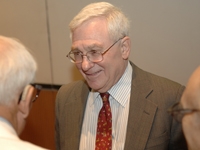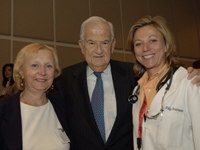
Dr. Herbert Benson
The substantial effects of stress on the body are only beginning to be understood, but research has already shown that they are comprehensive and profound. Thirty-five years ago, when Dr. Herbert Benson began his first studies of the relationship between stress and the body, the concept of mind/body medicine seemed both oxymoronic and a breach of the Western medical mind-body dichotomy. Today it is not only a scientifically valid field, but also one of the most commonly discussed medical topics, by doctors and patients alike.
On April 6 in the Uris Auditorium, Dr. Benson, the 2006 Holly Andersen Visiting Professor of the Department of Medicine, discussed his early research into the connection between relaxation and the human body and led a rapt, near-capacity crowd of faculty and staff into a state of transcendental meditation.
According to Dr. Benson, who is also founder and president of the Mind/Body Medical Institute and an associate professor of medicine at Harvard Medical School, health care has traditionally rested upon the twin pillars of pharmacology and surgery. Over the past several decades, though, science has validated a third pillar—self-care, through an understanding of the mind-body relationship. Dr. Benson believes that as many as 60 percent to 90 percent of hospital visits involve conditions that are in some way related to stress and the mind, including anxiety, hypertension, chronic pain, depression and infertility, to name a few.
Early in his career, several practitioners of transcendental meditation approached Dr. Benson to participate in his model for stress-induced hypertension; up until then, he had been using operantly conditioned squirrel monkeys to determine the relationship between stress and blood pressure.

From left: Dr. Mary Charlson, executive director of the Weill Cornell Center for Complementary and Integrative Medicine; Dr. Isadore Rosenfeld, the Ida and Theo Rossi Distinguished Professor of Clinical Medicine; and Dr. Holly Andersen, assistant professor of clinical medicine.
Dr. Benson divided the individuals into two groups; one sat quietly for 20 minutes while the other actively meditated. "The only difference was the content of their thoughts," Dr. Benson said.
The results were immediately striking. The meditation group showed distinct, profound biological changes including decreased metabolism, rate of breathing, heart rate and slower brain-wave activity.
Dr. Benson subsequently dedicated his life to examining the results he first came upon during these early trials; he has since found that every culture he has studied practices the common elements of transcendental meditation—repetition of a word, sound, thought, phrase or muscular activity; and a return to repetition when other thoughts intrude—typically within a religious context.
"We have discovered nothing new," Dr. Benson said. "We are imposing our modern language on techniques that have been practiced for centuries."
Nevertheless, a more complete understanding of the effects of meditation on the body could provide breakthroughs in the treatment of some of modern society's most common diseases—specifically cardiac-related conditions. "We can effectively treat any stress-related disorder," Dr. Benson said. "I believe this has profound implications for the treatment of metabolic syndromes, as well. These studies are ripe to be done."
Near the end of his lecture, Dr. Benson silenced his audience and began a collective meditation perhaps best characterized by a very palpable hush that blanketed the auditorium. When the exercise concluded, Dr. Benson asked the audience what they felt. From near the back, a voice reported: "I feel an inexplicable sense of well-being."
Photos by Amelia Panico.

